Data warehouses play a crucial role in storing, managing, and analyzing large volumes of structured data from various sources. They provide a centralized repository for business intelligence, reporting, and data-driven decision-making.
In this article, we’ll explore the top 5 data warehouse tools that can help you efficiently store and analyze your data, enabling you to gain valuable insights and drive business growth.
#1 Snowflake – Cloud-Built Data Warehouse for Scalability and Performance

Snowflake is a cloud-based data warehouse platform designed for scalability, performance, and ease of use.
With its unique architecture and data sharing capabilities, Snowflake enables businesses to store, manage, and analyze data efficiently, without the need for extensive infrastructure management.
Key Features:
- Scalable and elastic cloud architecture
- Support for structured and semi-structured data
- Data sharing and collaboration features
- Integration with various data integration and BI tools, including Coefficient
Use Cases:
- Building and managing enterprise data warehouses
- Enabling real-time data analytics and reporting
- Facilitating secure data sharing and collaboration
Pros:
- Scalable and high-performance data warehousing
- Seamless data sharing and collaboration
- Pay-as-you-go pricing model for cost optimization
- Easy integration with Coefficient for data import and analysis in spreadsheets
Cons:
- Higher costs compared to some other cloud data warehousing solutions
- Requires a shift in mindset from traditional on-premises data warehousing
#2 Amazon Redshift – Powerful and Cost-Effective Cloud Data Warehouse
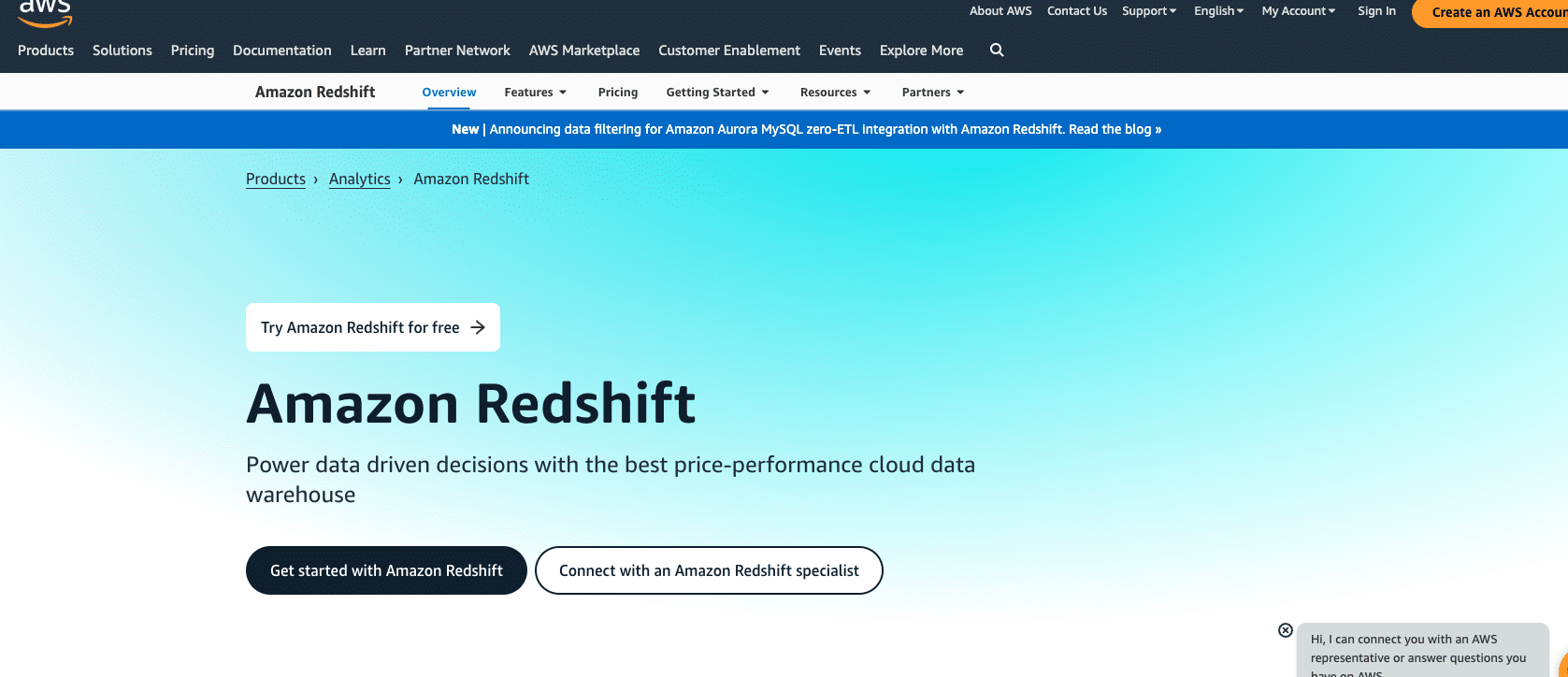
Amazon Redshift is a fully-managed, petabyte-scale cloud data warehouse that offers high performance and cost-efficiency.
With its columnar storage and parallel processing architecture, Redshift enables businesses to analyze large volumes of data quickly and easily.
Key Features:
- Petabyte-scale data warehousing
- Columnar storage and parallel processing for fast query performance
- Integration with AWS ecosystem and services
- Compatibility with various data integration and BI tools, including Coefficient
Use Cases:
- Storing and analyzing large volumes of structured data
- Powering business intelligence and reporting workloads
- Enabling ad-hoc querying and data exploration
Pros:
- Cost-effective and scalable cloud data warehousing
- Seamless integration with AWS ecosystem and services
- Fast query performance with columnar storage and parallel processing
- Easy data import and analysis with Coefficient integration
Cons:
- Requires familiarity with AWS services and concepts
- May have limitations for real-time data ingestion and processing
#3 PostgreSQL – Open-Source Relational Database for Data Warehousing
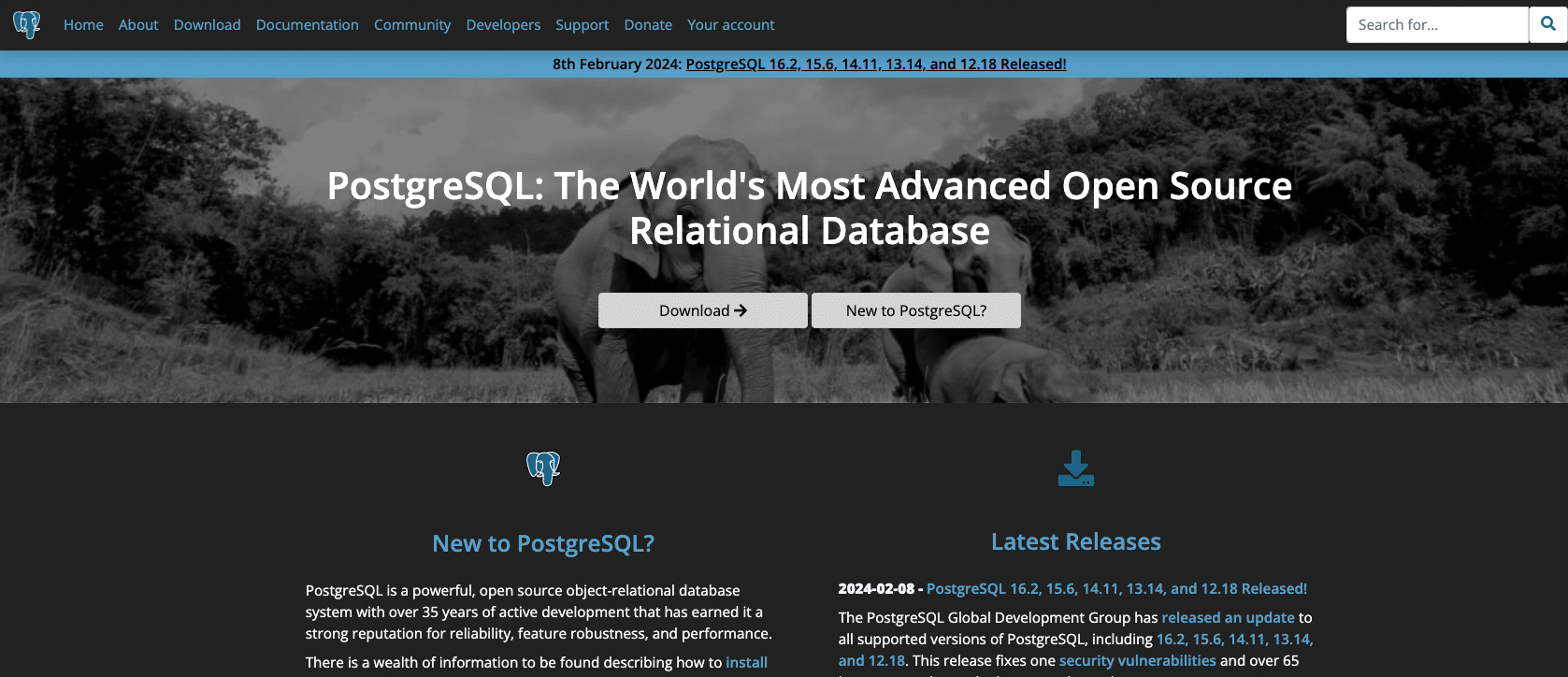
PostgreSQL is a powerful open-source relational database management system that can be used as a data warehouse solution.
With its robust features, extensibility, and support for advanced data types, PostgreSQL provides a flexible and cost-effective option for storing and analyzing structured data.
Key Features:
- Open-source and free to use
- Support for advanced data types and extensions
- ACID-compliant transactions and data integrity
- Integration with various data integration and BI tools, including Coefficient
Use Cases:
- Building small to medium-scale data warehouses
- Storing and analyzing structured data from various sources
- Enabling data-driven applications and reporting
Pros:
- Cost-effective and flexible open-source solution
- Robust feature set and extensibility
- Strong community support and extensive documentation
- Seamless integration with Coefficient for data import and analysis
Cons:
- May require more manual configuration and optimization compared to managed solutions
- Scalability limitations for very large datasets and high concurrency workloads
#4 Google BigQuery – Serverless and Highly Scalable Cloud Data Warehouse
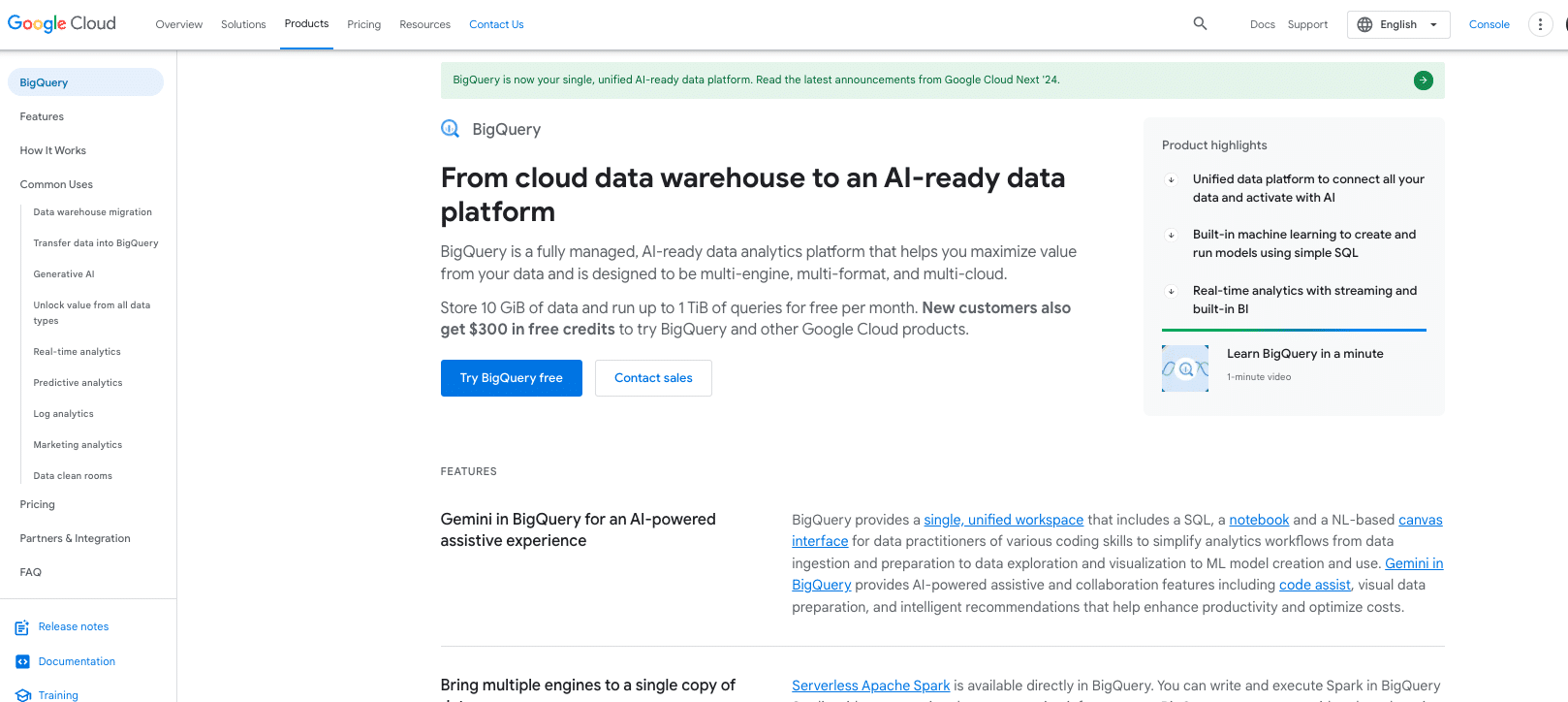
Google BigQuery is a fully-managed, serverless cloud data warehouse that offers high scalability and performance. With its SQL-like interface and integration with Google Cloud ecosystem, BigQuery enables businesses to analyze massive datasets quickly and easily.
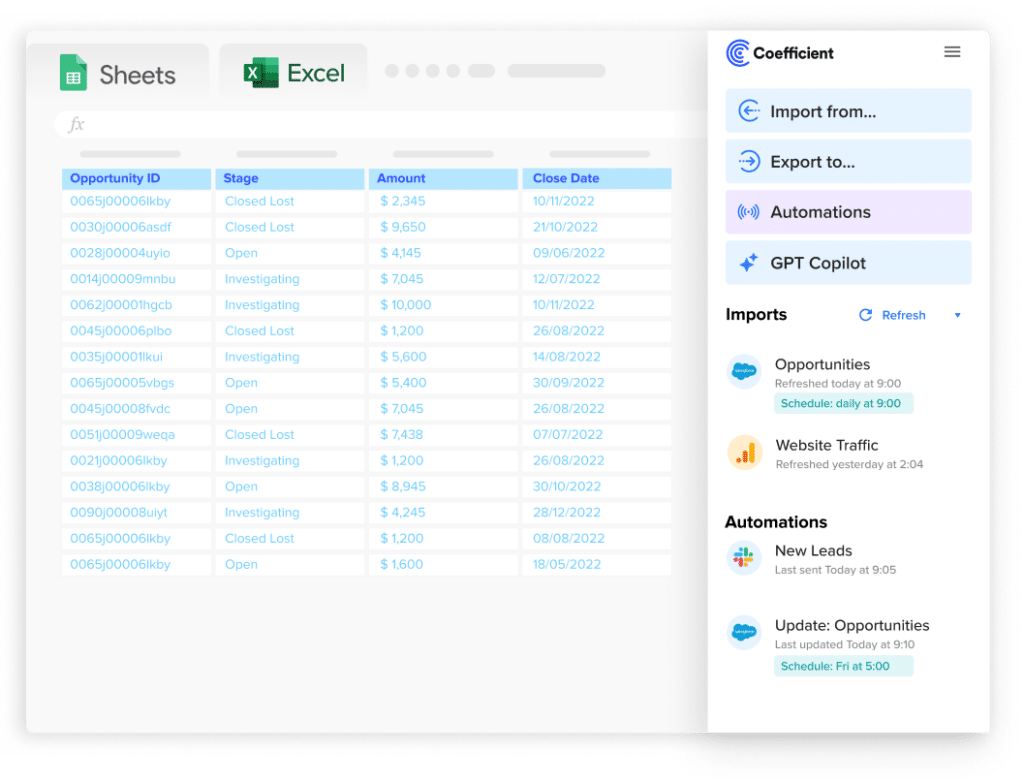
Stop exporting data manually. Sync data from your business systems into Google Sheets or Excel with Coefficient and set it on a refresh schedule.
Get Started
Key Features:
- Serverless and highly scalable architecture
- Support for SQL-like querying and data analysis
- Integration with Google Cloud ecosystem and services
- Compatibility with various data integration and BI tools, including Coefficient
Use Cases:
- Analyzing massive datasets and big data workloads
- Enabling real-time data analytics and reporting
- Powering machine learning and advanced analytics use cases
Pros:
- Highly scalable and serverless architecture
- Fast query performance for large datasets
- Seamless integration with Google Cloud ecosystem and services
- Easy data import and analysis with Coefficient integration
Cons:
- Requires familiarity with Google Cloud Platform and concepts
- May have higher costs for certain workloads and data volumes
#5 Teradata – Enterprise-Grade Data Warehouse for Large-Scale Analytics
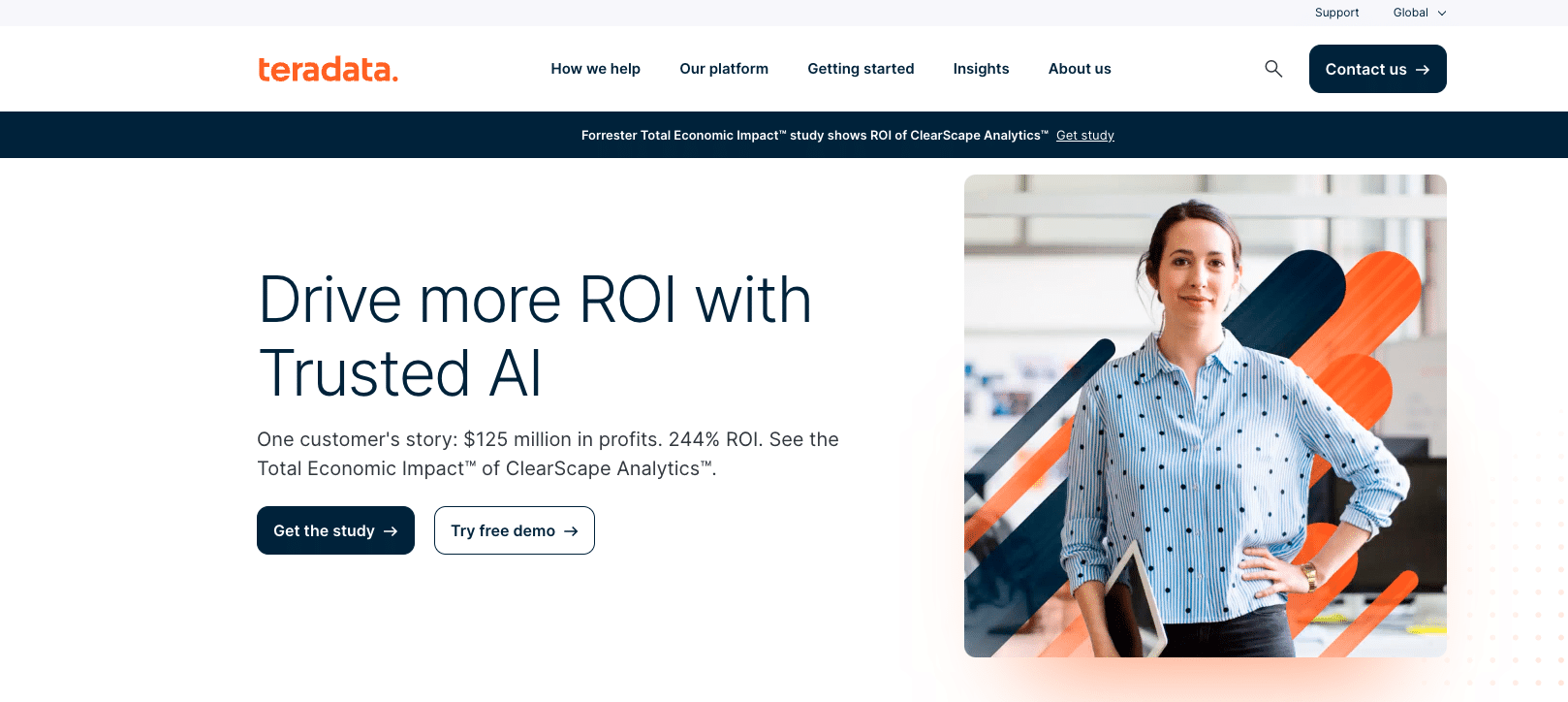
Teradata is a leading enterprise-grade data warehouse platform known for its scalability, performance, and advanced analytics capabilities.
With its parallel processing architecture and support for complex queries, Teradata enables businesses to analyze massive volumes of data efficiently.
Key Features:
- Massively parallel processing architecture for high performance
- Support for complex queries and advanced analytics
- Robust data management and security features
- Integration with various data integration and BI tools
Use Cases:
- Building and managing large-scale enterprise data warehouses
- Enabling advanced analytics and data science workloads
- Supporting complex querying and data exploration
Pros:
- Highly scalable and performant for large-scale data warehousing
- Advanced analytics and data science capabilities
- Robust data management and security features
Cons:
- Higher cost compared to cloud-based data warehouse solutions
- Requires specialized skills and resources to manage and maintain
Comparison Table: Data Warehouse Tools
| Feature | Snowflake | Amazon Redshift | PostgreSQL | Google BigQuery | Teradata |
| Deployment Model | Cloud | Cloud | On-Premises, Cloud | Cloud | On-Premises, Cloud |
| Scalability | High | High | Moderate | Very High | High |
| Query Performance | High | High | Moderate | High | High |
| Data Sharing | Yes | Partial | Partial | Partial | Partial |
| Integration with Coefficient | Yes | Yes | Yes | Yes | No |
| Pricing Model | Pay-as-you-go | Pay-as-you-go | Free, Paid Editions | Pay-as-you-go | Subscription |
| Target Audience | Enterprises | Enterprises | All | Enterprises | Enterprises |
How to Choose the Right Data Warehouse
When selecting a data warehouse tool, consider the following factors:
- Scalability and performance: Assess the tool’s ability to handle your current and future data volume and concurrent query workloads.
- Data integration and compatibility: Ensure the tool integrates well with your existing data sources, ETL tools, and BI solutions.
- Ease of use and management: Consider the learning curve and the level of expertise required to set up, manage, and maintain the data warehouse.
- Cost and pricing model: Evaluate the pricing model and total cost of ownership, considering factors such as data storage, querying, and data transfer costs.
- Security and compliance: Verify that the tool meets your data security and compliance requirements, especially for sensitive or regulated data.
Unlock Business Insights with the Right Data Warehouse Tool
Choosing the right data warehouse tool is crucial for storing, managing, and analyzing your data efficiently. By evaluating the features, pros, and cons of the top 5 tools discussed in this article – Snowflake, Amazon Redshift, PostgreSQL, Google BigQuery, and Teradata – you can find the one that best aligns with your specific data warehousing needs and business requirements.
To further empower your business users and enable self-service data analysis, consider integrating your chosen data warehouse with Coefficient. Coefficient allows users to seamlessly import data from Snowflake, Amazon Redshift, PostgreSQL, and Google BigQuery directly into Google Sheets or Excel, without the need for complex data pipelines or technical expertise.
With Coefficient, your business users can access, analyze, and derive insights from data using the familiar spreadsheet interface, driving data-driven decision-making across your organization. Sign up for Coefficient today and unlock the full potential of your data warehouse!


